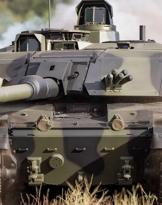Immediately after the massive cyber attack, Her Majesty's government made the decision to send another 50 soldiers, including SAS and SBS, to Iraq, to which another 120 will be added within a few weeks. Several SAS teams have been deployed in Iraq for months.
The primary aim is to sow panic among the terrorists, acting exclusively at night from a secret base in the desert defined as impregnable, the Iraqi Area-51. The group of gods acts autonomously "Sixty" in order to bring the head of John the Jihadist to London.
The 'We're coming to get YOU' operation involves the use of two thousand men belonging to all the branches of the English armed forces who within a few weeks will arrive in Iraq to fortify "the Area-51". London has authorized all hunter killer, targeting leader and man hunting missions.
The new contingent will join the Peshmerga, the military forces of Iraqi Kurdistan. The decision was taken by the National Security Council, chaired by Prime Minister David Cameron.
"Britain cannot independently decide to send regular troops to Iraq and Syria, but we will not be watching the terrorists' atrocities without doing anything. Our force deployed in Iraq will have no mercy for the men of the Caliph, even if we keep someone alive. "
London, therefore, has decided to follow the new strategy of the White House: reinforcement of the contingents and green light for all the missions of the special units present in Iraq and if necessary also in Syrian territory, as happened for the raid against Aby Sayyaf, considered one of the major financiers of the criminal organization. The goal is to confuse and undermine the chain of command, carrying out a series of operations ranging from psychological and computer warfare to night raids.
The terrorists know perfectly well that against Western special forces, they have no hope. In all the clashes known to date between the al-Baghdadi militia and the western commandos, the outcome has always been the same.
"We know we are having an effect among terrorists because they have changed their tactics. Now they don't know who to trust anymore. Many of our SAS work for years in Iraq: we speak their language perfectly, we dress like them, we talk to their elders, we have their beard. We are in their midst, in their backyard and have never known it. We were just waiting for permission from London to hit them mercilessly and that's what we're going to do. We will leave someone alive, but only because we need information ".
London, therefore, is following the example of the French in Mali. Paris in January of the 2013 launched Operation Barkhane against al-Qaeda militants in the Region, creating a powerful front-line fighting force formed by three thousand men with a single purpose: to eliminate the jihadists that raged from eastern Chad to Mauritania. The same tactic adopted by the British who have been working for months to instill fear in the enemy. Nocturnal operations, an average of twelve targets eliminated by 'beat' and withdrawn.

In addition to the SAS, the British could also send 200 Gurkha, a select department that London has deployed in every conflict in which it has been committed. Only one Gurkha is called 'One Man Army'.
A famous episode that the terrorists in Afghanistan remember well. Sergeant Dipprasad Pun, the night of the 25 March of the 2011, was sentinel near Babaji in the province of Helmand, in southern Afghanistan, when he was attacked by fifty terrorists, convinced of a very easy prey. And they made their first mistake.
Dipprasad Pun was a highly decorated Gurkha soldier. Of the fifty terrorists who attacked him, in thirty never returned home, in twenty they fled. The soldier fired all his supplied 400 shots, threw seventeen hand grenades and blew up a mine. Once the bullets were finished, he passed to the two kukri (40 cm Nepalese knives, representing the courage and value of the warrior). This was the second mistake: they confronted him hand in hand. The insurgents up to that point also ignored the Gurkha motto, "Better to die than to live like a coward". And it was their last mistake.
Franco Iacch
(photo: MoD UK / web)












